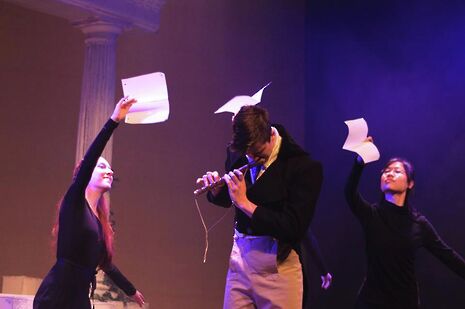Theatre: The Magic Flute
Caroline Hopper is impressed by this rare ADC staging of student opera

The first opera the ADC has seen in almost a decade, The Magic Flute, has set the bar extremely high. The story has been brought into the time of the Grand Tour, a setting which, with its enthusiasm for the classical past (and its opportunity for period dress), subtly complements the performance.
The cast of the opera, directed by Robert Hawkins, is crucial to its great success. Joel Williams’s Tamino displayed almost flawless top-range vocals, while Anna Cavaliero’s Pamina stunned the audience with beautiful emotion, particularly in her second act aria. Johnny Hyde’s comic timing as Papageno was spot on, and allowed for any onstage/offstage ‘magic flute’ issues to be resolved with some quick improvisatory expression.
What the Queen of the Night (Billie Robson) lacked in stage presence, she made up for in her diction (something the other singers could have paid slightly more attention to), not to mention her coloratura notes, achieving clear, bell-like tones in an aria that is traditionally one of the most difficult in the world of opera.
Xavier Hertherington’s Monostatos steals every single scene he’s in. He is perhaps the one person whose acting is even better than his singing – and this is not to put his singing down in any way at all. Hertherington had the audience in the palm of his hand with a performance that, I have been told, is different in every rehearsal, and looks set to be so every night.
The 15-person orchestra began with the odd tuning issue, which did not do the singers justice. However, the band coped extremely well with the restraints of the ADC pit, such as the need to relegate the superb keys player to playing on an unconvincing-sounding electric keyboard. Musical Director Quintin Beer’s conducting made sure that the ensemble remained outstanding.
The choreography was simple yet effective, and although rather excessive in the second half, it was weaved into the relationship between two principle characters with comic effect. The main stage piece, a Greek pillared arch, fitted seamlessly into every scene, and harked back to the classical past with which the Grand Tour was concerned. It also left room for the statues to be wheeled on and off, the chaise longue to announce scene changes, and provided something for Monostatos to hide behind.
The attention to detail that must have gone into this opera is actually not obvious at all, because the production was so slick it appeared to be completely effortless. As far as student opera goes, The Magic Flute is in a league of its own.
 News / Cambridge study finds students learn better with notes than AI13 December 2025
News / Cambridge study finds students learn better with notes than AI13 December 2025 News / Cambridge Vet School gets lifeline year to stay accredited28 November 2025
News / Cambridge Vet School gets lifeline year to stay accredited28 November 2025 Science / Did your ex trip on King’s Parade? The science behind the ‘ick’12 December 2025
Science / Did your ex trip on King’s Parade? The science behind the ‘ick’12 December 2025 News / Uni Scout and Guide Club affirms trans inclusion 12 December 2025
News / Uni Scout and Guide Club affirms trans inclusion 12 December 2025 Arts / Modern Modernist Centenary: T. S. Eliot13 December 2025
Arts / Modern Modernist Centenary: T. S. Eliot13 December 2025







